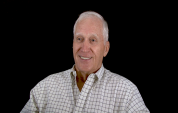7:31 | Willard Womack was nervously awaiting the news of what happened to the helicopter carrying some of his friends who had just participated in the Battle of Ap Bac, a crucial turning point early in the war. They had come though that unscathed but were now missing. Decades later, he received an email that brought the memories flooding back. Part 3 of 3. (This interview made possible with the support of RALPH J. TINGLE.)
Keywords : Willard Womack pilot Vietnam Charles Fitts Lewis Stone helicopter crash Ap Bac Vietnam Distinguished Flying Cross (DFC) Vietnam Veterans Memorial The Wall Fort Rucker Neil Sheehan A Bright Shining Lie: John Paul Vann and America in Vietnam John Paul Vann Congress Army of the Republic of Vietnam (ARVN) Vietnamese

After receiving his pilot's license through Army ROTC, Willard Womack was committed to Army flight school. There he met an instructor who reminded him of someone and he made it the top of his class. Flying came naturally to him, it seemed. (This interview made possible with the support of RALPH J. TINGLE.)
After flight school, Willard Womack was sent to a tiny detachment with no planes. It's purpose was to set up and run combat air fields. The unit was sent to Okinawa to run an airfield there where a helicopter company was based. That company went off on a training mission to the Philippines and didn't come back. Womack and his unit soon followed to a place most had never heard of, Vietnam. (This interview made possible with the support of RALPH J. TINGLE.)
Sailing from Okinawa to Vietnam on an LST was miserable for Willard Womack, thanks to the bobbing of the landing craft on the waves and the diesel exhaust in his air vent. Once in country, he was surprised how behind the times everything was. (This interview made possible with the support of RALPH J. TINGLE.)
It was all advisors when Willard Womack went to Vietnam. The Army pilot was part of the early effort to help the South resist the insurgency. The rules for the advisors were very stringent and often stymied the progress of the war. (This interview made possible with the support of RALPH J. TINGLE.)
There was not much for Willard Womack to do at the Soc Trang air field early in the war. He flew small observation planes to support a helicopter unit and he was the supply officer. The unit had an exotic pet, which supplied some laughs, and there were nightly movies. (This interview made possible with the support of RALPH J. TINGLE.)
The plane was a Cessna Bird Dog and Willard Womack flew it in support of a helicopter company, frequently on evacuation missions. The troops were all Vietnamese, and when the unit's flight surgeon found out what their doctors were actually doing at the evacuation hospital, they stopped flying the rescue missions for them. (This interview made possible with the support of RALPH J. TINGLE.)
Willard Womack gives his account of the Battle of Ap Bac, a significant turning point in the Vietnam War. It begins with him hitching a flight to Saigon to pick up the pay for his outfit. Detoured on his way back to his base, he saw a group of men listening intently to a firefight on a radio. Part 1 of 3. (This interview made possible with the support of RALPH J. TINGLE.)
As the American advisor argued with his Vietnamese counterpart over the radio, Willard Womack, an Army pilot stuck in transit, could hear the frustration mounting. The battle of Ap Bac could not be won with these tactics. Eventually, the evacuation was made and, weeks later, several of the aviators involved hitched a ride to Saigon for a night of carousing. Pt 2 of 3. (This interview made possible with the support of RALPH J. TINGLE.)
Army pilot Willard Womack's job was to support a helicopter company in his spotter plane, usually from above the action. He tells how he came to be just 300 feet off the ground the only time he took a round in the plane. (This interview made possible with the support of RALPH J. TINGLE.)
In Vietnam, Army pilot Willard Womack visited Saigon several times, usually because he was ferrying someone around but he had a few occasions to get out and see the place. He remembers a wild ride in a pedicab in the chaotic traffic. This was way more exciting than his duty, which was mostly ferrying people around in a Cessna. (This interview made possible with the support of RALPH J. TINGLE.)
Wherever there are weapons, there is always the potential for accidents. Army pilot Willard Womack recalls several times when carelessness caused trouble during his tour in Vietnam. (This interview made possible with the support of RALPH J. TINGLE.)
Willard Womack was a pilot in the Army but everyone in the Army has other duties and his was supply. As supply officer, he had a first row seat to the spectacle of Army bureaucracy and reveals how the last scene of Indiana Jones just might be true, that there are stacks of things around the world lost in paperwork. (This interview made possible with the support of RALPH J. TINGLE.)
Army pilot Willard Womack explains how his Air Medals are no big deal because they were automatic with the number of combat missions flown. And in a guerrilla war like Vietnam, every flight was a combat mission. (This interview made possible with the support of RALPH J. TINGLE.)